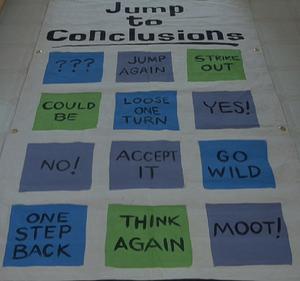 The startup mentality is great: “this is wrong; I’m going to fix it.” This kind of innovative thinking disrupts how we travel, talk to friends, look at data, keep track of fans, spread music, and more…. In the startup world, quite often we see former employees of big companies creating a startup because their experience in big companies gave light to a problem. When they speak in interviews, we hear things like:
The startup mentality is great: “this is wrong; I’m going to fix it.” This kind of innovative thinking disrupts how we travel, talk to friends, look at data, keep track of fans, spread music, and more…. In the startup world, quite often we see former employees of big companies creating a startup because their experience in big companies gave light to a problem. When they speak in interviews, we hear things like:
“I didn’t like the way I had to use X to do Y, so I created Z to do it faster and better.”
–Successful Entrepreneur
Cut to the budding young entrepreneur – a student looking for an alternative to working for BigCorp., a fresh graduate interning at a startup, or anyone taking considering taking the leap from boring job to startup job. He reads up on his daily tech interviews in order to learn as much as he can about the entrepreneurial world, and he comes across this video. Applying the lesson to his own case, he thinks, “Doing A seems really hard, and it isn’t Social, Mobile, or Local. I’ll make B in order to make A easer and better!”
What’s the problem here? Is it that jump-to-conclusion addition of trendy features? Well, maybe… but that’s not the point here. The problem is young entrepreneurs to enter spaces in which they have no experience. While the former, successful Entrepreneur had a long history with working in his space, identifying it’s weaknesses, and deciding that no sufficient product existed already; the budding entrepreneur decides to enter a space and THEN begins to identify its weaknesses.
If you’re trying to disrupt a space, count how many collective years of experience in that space your founding team has…

…When I say years of experience, I don’t mean as users, I mean as employees. I recently spoke with a startup with a young team that’s trying to disrupt how we do online dating. I completely agree, from a user’s point of view, that the reputation, interaction, and methodology of online dating could use an overhaul. When talking with them about their product, I curiously asked who among the team had worked at an online dating company before – none of them. I then asked who among them had extensive experience doing online dating – they all had accounts to the major brands, but I had a feeling none of them had any real experience meeting someone through online dating.
As an entrepreneur, this makes me dubious in terms of joining a project like that. As a journalist, this makes me less inclined to write about their cause. And for VCs and Angels, you can bet your boot-strapped behind that they’re going to ask this, and unless you have a mentor or investor who is a king in your space, you are going to have some real trouble convincing investors that you are the team that’s going to disrupt that space.
Be wary of what you don’t like… it might just be you!
I think the idea of disrupting a space with which you’re familiar is an especially important idea in France (along with many other young startup ecosystems). In the same way a teenager gets a nose-piercing to rebel against their parents, it is an easy jump to take a bad personal experience and assume that the answer is to disrupt that space – such as the education space in France. While it’s great to try to improve every space you’ve ever felt disappointed you, I think the fact of the matter is that, in the same way that someone who had a terrible user experience is much less fit to disrupt that space than someone who made a career out of working in that space, a country with a better reputation in a space is more fit to disrupt that space.
Before you “get a nose-piercing,” think about how many other “teenagers” have thought to get nose-piercings in order to rebel against “their parents.” If you’re not the only one you know who’s done it, what are the odds that your nose-piercing is going to disrupt a space?
Check out some of our other articles, or leave us a RUDE comment below:
